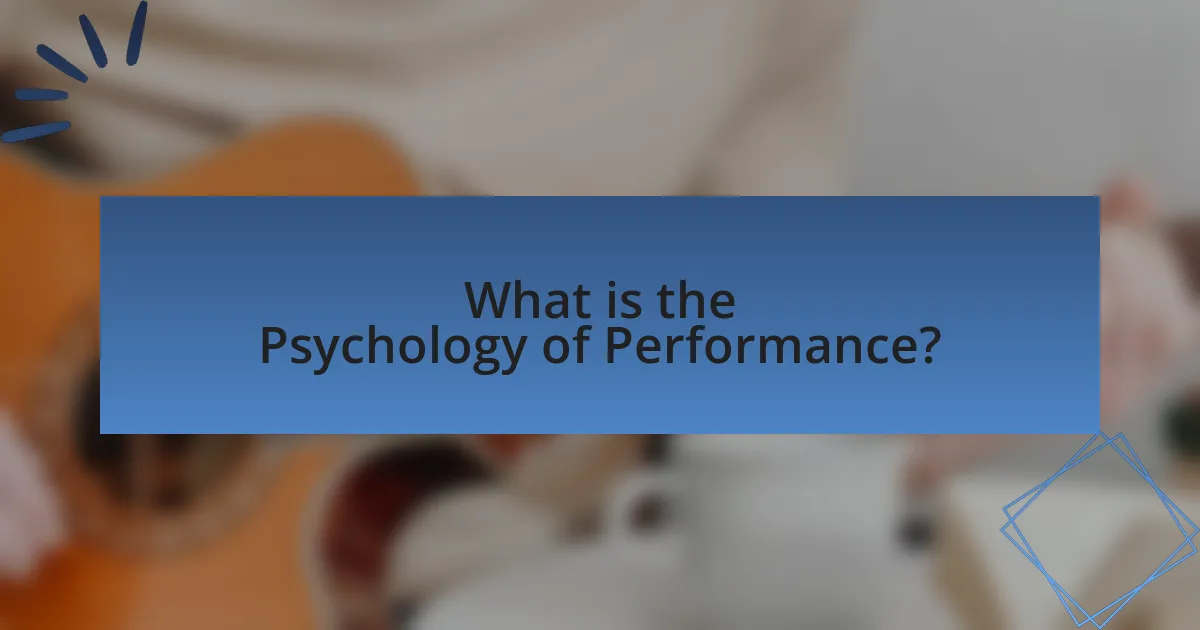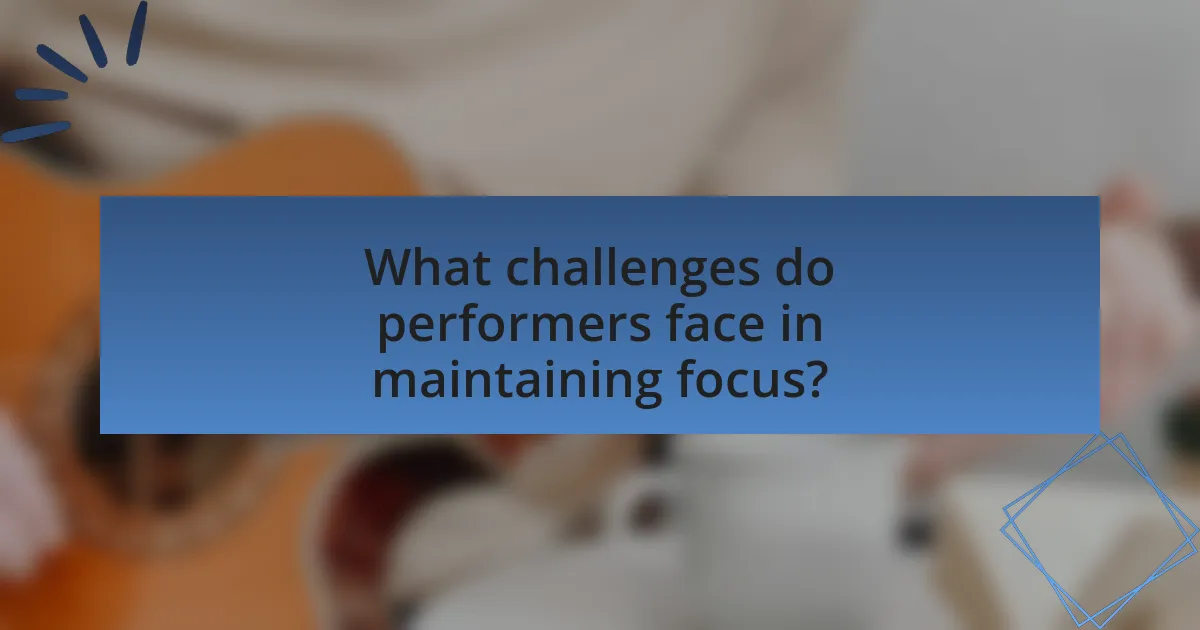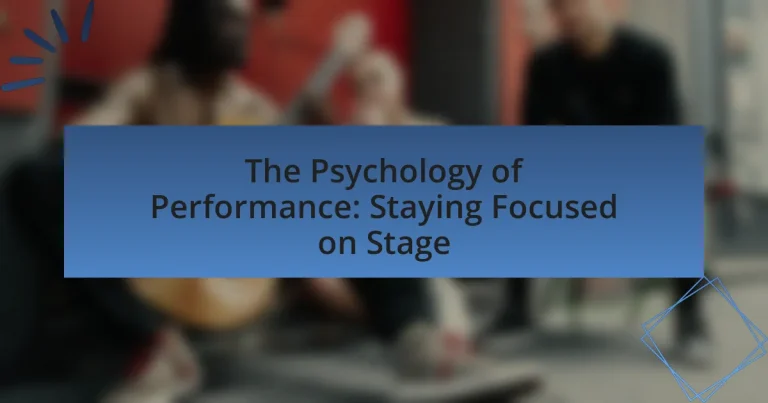The main entity of the article is the Psychology of Performance, which explores the mental processes and emotional factors that affect an individual’s ability to perform effectively in high-pressure situations. The article examines how cognitive functions such as attention, motivation, and anxiety influence performance outcomes, emphasizing the importance of maintaining focus and managing emotions. Key topics include the impact of psychological factors on stage presence, techniques for enhancing focus, the role of rehearsal, and strategies to overcome performance anxiety. Additionally, it discusses the consequences of losing focus and the benefits of physical conditioning and mental preparation for optimal performance.

What is the Psychology of Performance?
The Psychology of Performance refers to the mental processes and emotional factors that influence an individual’s ability to perform effectively in high-pressure situations, such as public speaking or performing arts. This field examines how cognitive functions, such as attention, motivation, and anxiety, impact performance outcomes. Research indicates that optimal performance is often achieved when individuals experience a balance of arousal and focus, as outlined in the Yerkes-Dodson Law, which states that performance improves with increased arousal to a certain point, after which it declines. Understanding these psychological elements can help performers develop strategies to enhance focus and manage anxiety, ultimately leading to improved performance on stage.
How does the psychology of performance influence stage presence?
The psychology of performance significantly influences stage presence by shaping how performers manage anxiety, focus attention, and engage with their audience. Performers who understand their psychological state can utilize techniques such as visualization and positive self-talk to enhance their confidence and reduce performance anxiety, leading to a more commanding presence on stage. Research indicates that performers who practice mindfulness and self-regulation techniques exhibit improved focus and emotional control, which directly correlates with their ability to connect with the audience and deliver a compelling performance. For instance, a study published in the Journal of Applied Psychology found that performers who engaged in mental rehearsal showed increased self-efficacy and better stage presence during live performances.
What psychological factors contribute to effective performance?
Psychological factors that contribute to effective performance include motivation, self-efficacy, focus, and emotional regulation. Motivation drives individuals to set and achieve goals, while self-efficacy, defined as the belief in one’s ability to succeed, enhances persistence and resilience in challenging situations. Focus allows performers to concentrate on the task at hand, minimizing distractions, which is crucial in high-pressure environments. Emotional regulation helps individuals manage anxiety and stress, enabling them to perform optimally under pressure. Research by Bandura (1997) highlights the importance of self-efficacy in performance outcomes, demonstrating that individuals with higher self-efficacy are more likely to achieve their goals.
How do emotions impact a performer’s ability to focus?
Emotions significantly impact a performer’s ability to focus by influencing cognitive processes and attention control. When performers experience heightened emotions, such as anxiety or excitement, their ability to concentrate on the task at hand can be compromised, leading to distractions and decreased performance quality. Research indicates that negative emotions, like anxiety, can narrow attention and impair working memory, while positive emotions can enhance creativity and problem-solving abilities. For instance, a study published in the Journal of Experimental Psychology found that performers under stress exhibited reduced focus and increased errors, demonstrating the direct correlation between emotional states and performance outcomes.
Why is staying focused important during a performance?
Staying focused during a performance is crucial because it directly impacts the quality and effectiveness of the presentation. When performers maintain concentration, they can execute their skills accurately, respond to the audience’s reactions, and adapt to any unexpected changes. Research indicates that heightened focus enhances cognitive processing, allowing performers to access their training and instincts more effectively, which is essential for delivering a seamless performance. For instance, a study published in the Journal of Applied Psychology found that athletes who practiced mindfulness techniques, which promote focus, showed improved performance metrics compared to those who did not. This evidence underscores the importance of focus in achieving optimal performance outcomes.
What are the consequences of losing focus on stage?
Losing focus on stage can lead to significant negative consequences, including decreased performance quality, increased anxiety, and potential audience disengagement. When performers lose concentration, they may forget lines, miss cues, or fail to connect with the audience, which can diminish the overall impact of the performance. Research indicates that distractions can impair cognitive processing, leading to errors and a lack of coherence in the presentation. For instance, a study published in the Journal of Experimental Psychology found that divided attention can significantly reduce task performance, highlighting the importance of maintaining focus during live performances.
How does focus enhance audience engagement?
Focus enhances audience engagement by directing attention to key messages and elements of a performance. When performers maintain focus, they create a more immersive experience, allowing the audience to connect emotionally and cognitively with the content. Research indicates that focused presentations can increase retention of information by up to 50%, as attention is a critical factor in memory formation. This heightened engagement results in a more impactful performance, fostering a stronger connection between the performer and the audience.

What techniques can performers use to maintain focus?
Performers can use techniques such as mindfulness, visualization, and structured routines to maintain focus. Mindfulness practices, including meditation, help performers stay present and reduce anxiety, which can enhance concentration during performances. Visualization techniques involve mentally rehearsing the performance, allowing performers to create a clear mental image of success, thereby improving focus and confidence. Additionally, establishing structured routines before going on stage can create a sense of familiarity and control, further aiding in maintaining focus. Research indicates that these techniques are effective; for instance, a study published in the Journal of Applied Sport Psychology found that athletes who practiced visualization showed improved performance and focus during competitions.
How can mental preparation improve focus on stage?
Mental preparation enhances focus on stage by equipping performers with techniques to manage anxiety and maintain concentration. Techniques such as visualization, mindfulness, and positive self-talk help performers create a mental framework that reduces distractions and fosters a state of flow. Research indicates that athletes and performers who engage in mental rehearsal experience improved performance outcomes, as demonstrated in a study published in the Journal of Applied Sport Psychology, which found that mental imagery significantly enhances focus and reduces performance anxiety. This evidence supports the assertion that mental preparation is crucial for maintaining focus during performances.
What role does visualization play in performance focus?
Visualization enhances performance focus by enabling individuals to mentally rehearse and prepare for their tasks, leading to improved concentration and execution. This cognitive technique allows performers to create vivid mental images of successful outcomes, which can reduce anxiety and increase confidence. Research indicates that athletes who engage in visualization techniques demonstrate better performance metrics, as seen in a study published in the Journal of Applied Sport Psychology, where participants who practiced visualization showed a 20% improvement in their performance compared to those who did not. Thus, visualization serves as a powerful tool in maintaining focus and enhancing overall performance.
How can mindfulness practices enhance concentration?
Mindfulness practices enhance concentration by training the mind to focus on the present moment, thereby reducing distractions. Research indicates that mindfulness meditation improves attention span and cognitive flexibility, which are crucial for maintaining concentration. A study published in the journal “Psychological Science” by Zeidan et al. (2010) found that participants who engaged in mindfulness meditation showed significant improvements in attention and cognitive performance compared to those who did not practice mindfulness. This evidence supports the assertion that mindfulness can effectively enhance concentration, particularly in high-pressure environments like performance settings.
What are the benefits of physical conditioning for focus?
Physical conditioning enhances focus by improving cognitive function and reducing stress. Regular exercise increases blood flow to the brain, which can enhance mental clarity and concentration. Studies show that aerobic exercise, for instance, boosts the production of brain-derived neurotrophic factor (BDNF), a protein linked to improved learning and memory. Additionally, physical conditioning helps regulate cortisol levels, a hormone associated with stress; lower stress levels contribute to better focus and attention. Therefore, engaging in consistent physical activity not only supports physical health but also significantly benefits mental focus and performance.
How does physical fitness correlate with mental clarity?
Physical fitness significantly enhances mental clarity by improving cognitive function and reducing stress. Regular physical activity increases blood flow to the brain, which can enhance memory, attention, and overall cognitive performance. Research published in the journal “Neuroscience & Biobehavioral Reviews” indicates that exercise promotes neurogenesis, the growth of new neurons, particularly in the hippocampus, a region associated with memory and learning. Additionally, physical fitness reduces levels of cortisol, a stress hormone that can impair cognitive function when elevated. This correlation suggests that individuals who maintain a regular fitness regimen are likely to experience improved focus and mental acuity, which is crucial for performance in high-pressure situations, such as public speaking or performing on stage.
What exercises can help improve focus for performers?
Mindfulness meditation and breathing exercises can significantly improve focus for performers. Mindfulness meditation enhances attention and reduces distractions by training the mind to remain present, which is crucial during performances. Research published in the journal “Psychological Science” by Zeidan et al. (2010) demonstrated that just a few sessions of mindfulness meditation can lead to improved attention and cognitive flexibility. Breathing exercises, such as diaphragmatic breathing, help regulate stress and anxiety, allowing performers to maintain concentration. A study in “The Journal of Clinical Psychology” by Brown et al. (2016) found that controlled breathing techniques can enhance focus and performance under pressure.

What challenges do performers face in maintaining focus?
Performers face several challenges in maintaining focus, including distractions from the audience, internal anxiety, and the pressure of performance expectations. Distractions can arise from audience reactions or environmental factors, which can divert attention away from the performance. Internal anxiety, often stemming from fear of failure or self-doubt, can disrupt concentration and lead to decreased performance quality. Additionally, the pressure to meet high expectations, whether self-imposed or external, can create mental clutter that hinders focus. Research indicates that these factors significantly impact a performer’s ability to concentrate, as highlighted in studies on performance psychology, which emphasize the importance of mental training and coping strategies to enhance focus during performances.
How do external distractions affect performance focus?
External distractions significantly impair performance focus by diverting attention away from the task at hand. Research indicates that distractions, such as noise or visual stimuli, can lead to decreased cognitive resources available for concentration, resulting in lower performance quality. A study published in the Journal of Experimental Psychology found that even brief interruptions can prolong the time it takes to complete tasks and increase errors, demonstrating the detrimental impact of external distractions on focus and overall performance.
What strategies can mitigate the impact of audience reactions?
To mitigate the impact of audience reactions, performers can employ strategies such as desensitization, cognitive restructuring, and focused breathing techniques. Desensitization involves gradually exposing oneself to audience settings to reduce anxiety and improve comfort levels, which has been shown to enhance performance quality. Cognitive restructuring helps performers reframe negative thoughts about audience reactions into positive affirmations, thereby reducing stress and enhancing focus. Focused breathing techniques, such as deep diaphragmatic breathing, can lower physiological arousal and promote a calm state, allowing performers to concentrate better on their performance rather than on audience feedback. These strategies are supported by psychological research indicating that managing anxiety and maintaining focus can significantly improve performance outcomes.
How can performers handle unexpected interruptions?
Performers can handle unexpected interruptions by maintaining composure and quickly adapting to the situation. This involves taking a deep breath, assessing the interruption, and deciding whether to acknowledge it or continue performing. Research indicates that performers who practice mindfulness techniques, such as focusing on their breath or grounding themselves in the moment, are better equipped to manage disruptions effectively. For instance, a study published in the Journal of Applied Psychology found that mindfulness can enhance emotional regulation and reduce anxiety, allowing performers to regain focus after an interruption.
What internal factors can hinder focus during a performance?
Internal factors that can hinder focus during a performance include anxiety, self-doubt, and intrusive thoughts. Anxiety can create a heightened state of nervousness, leading to distraction and impaired concentration. Self-doubt undermines confidence, causing performers to second-guess their abilities, which detracts from their focus on the task at hand. Intrusive thoughts, such as worries about audience perception or performance outcomes, can disrupt mental clarity and divert attention away from the performance itself. Research indicates that these psychological barriers can significantly impact performance quality, as evidenced by studies showing that heightened anxiety correlates with decreased focus and increased errors in performance settings.
How do self-doubt and anxiety impact concentration?
Self-doubt and anxiety significantly impair concentration by disrupting cognitive processes essential for focus. When individuals experience self-doubt, their attention is diverted towards negative self-evaluation, which reduces their ability to concentrate on tasks at hand. Anxiety triggers physiological responses, such as increased heart rate and heightened arousal, which can lead to difficulties in maintaining attention and processing information effectively. Research indicates that anxiety can decrease working memory capacity, making it harder to concentrate on complex tasks (Eysenck et al., 2007). Thus, both self-doubt and anxiety create mental distractions that hinder optimal concentration levels necessary for performance.
What techniques can help overcome performance anxiety?
Techniques that can help overcome performance anxiety include deep breathing exercises, visualization, and cognitive restructuring. Deep breathing exercises, such as inhaling deeply for a count of four, holding for four, and exhaling for four, can activate the body’s relaxation response, reducing anxiety symptoms. Visualization involves imagining a successful performance, which can enhance confidence and reduce fear. Cognitive restructuring helps individuals identify and challenge negative thoughts related to performance, replacing them with positive affirmations. Research indicates that these techniques can significantly lower anxiety levels and improve performance outcomes, as evidenced by a study published in the Journal of Applied Psychology, which found that cognitive-behavioral strategies effectively reduce performance anxiety in various contexts.
What practical tips can enhance focus on stage?
To enhance focus on stage, performers should implement techniques such as deep breathing, visualization, and mindfulness. Deep breathing helps regulate anxiety and increases oxygen flow, which can improve concentration. Visualization involves mentally rehearsing the performance, allowing the performer to create a clear mental image of success, thereby reducing distractions. Mindfulness practices, such as staying present and aware of one’s surroundings, can further enhance focus by minimizing intrusive thoughts. Research indicates that these techniques can significantly improve performance quality and reduce stage fright, as evidenced by studies showing that mindfulness training leads to better attention control and emotional regulation in performers.
How can pre-performance routines improve focus?
Pre-performance routines can improve focus by creating a structured mental and physical preparation process that reduces anxiety and enhances concentration. These routines help performers establish a consistent mindset, allowing them to enter a state of flow, which is characterized by heightened focus and engagement. Research indicates that athletes and performers who engage in pre-performance routines experience lower levels of stress and improved performance outcomes, as these routines serve to signal the brain that it is time to focus on the task at hand. For example, a study published in the Journal of Sport Psychology found that athletes who practiced specific pre-performance rituals reported increased confidence and focus during competitions, demonstrating the effectiveness of such routines in enhancing mental clarity and performance readiness.
What role does rehearsal play in building confidence and focus?
Rehearsal plays a crucial role in building confidence and focus by allowing performers to practice their material in a controlled environment. This repeated exposure to the performance content helps to solidify memory and reduce anxiety, as familiarity with the material leads to increased comfort levels. Research indicates that consistent rehearsal can enhance performance quality; for instance, a study published in the Journal of Applied Psychology found that individuals who engaged in regular practice demonstrated significantly higher confidence levels and improved focus during actual performances compared to those who did not rehearse. Thus, rehearsal not only prepares performers technically but also psychologically, fostering a sense of readiness that enhances overall performance.


